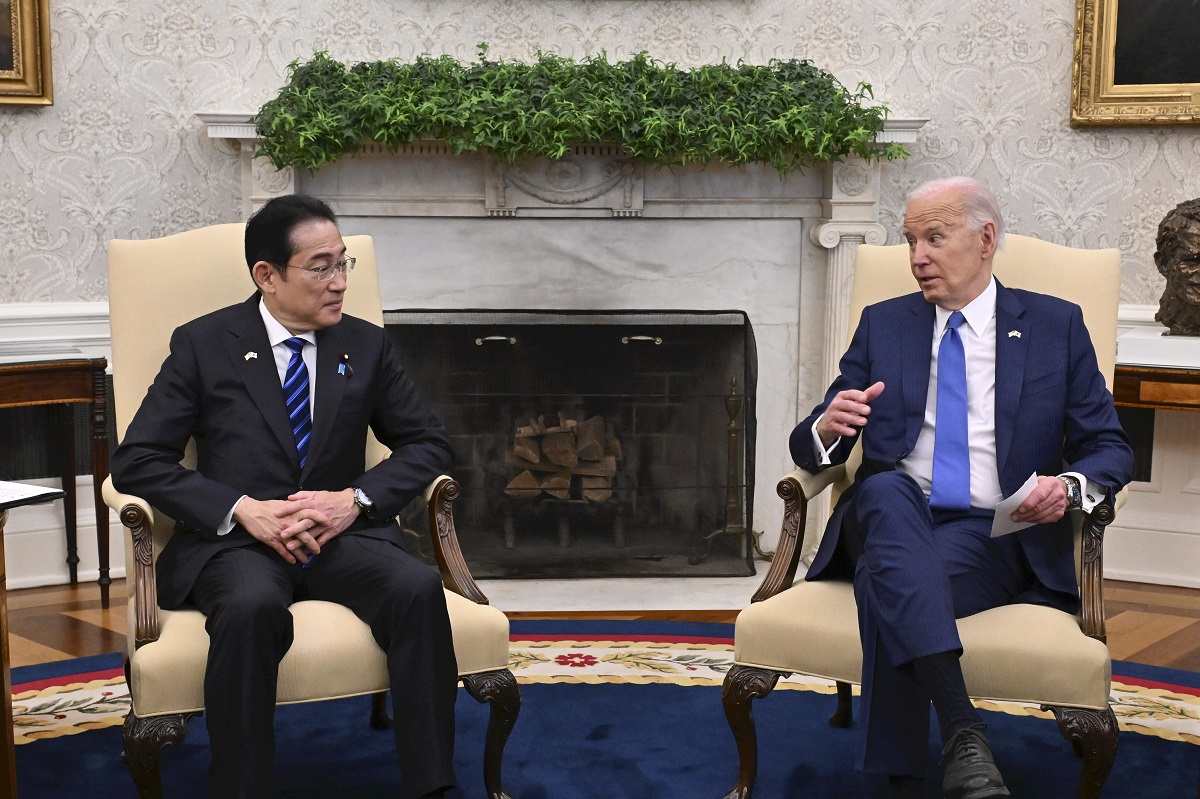Japan, U.S. to Cooperate in Scientific Research AI; Countries Agree to Share Resources to Speed Up Development

Prime Minister Fumio Kishida, left, and U.S. President Joe Biden speak in Washington on Wednesday.
20:00 JST, April 12, 2024
Japan and the United States have agreed to cooperate on the development of generative artificial intelligence dedicated to scientific research, a move aimed at giving both nations the upper hand in the international competition to develop this cutting-edge technology.
Under the agreement reached Wednesday, the two nations will share data used for AI learning and jointly use their super computers for AI development. This cooperation comes at a time when China and other nations are launching similar AI development programs.
Prime Minister Fumio Kishida underlined the importance of this agreement Wednesday. “Collaboration between Japan and the United States is indispensable to maintain and strengthen the competitive edge in the area of advanced technologies,” Kishida said at a joint press conference with U.S. President Joe Biden after their summit meeting in Washington. A joint statement issued by the leaders said that both governments and their research institutes would work together in the field of AI for scientific research purposes, and that both nations would earnestly work together on AI development.
AI that is dedicated to scientific research learns from a vast number of research papers as well as data from experiments. It is believed that applying this technology to experiments and other projects could significantly accelerate research speeds and also lead to expanded scopes of inquiry. Some observers have suggested that as this development progresses, it could “create a flurry of discoveries worthy of winning Nobel prizes.”
A major pillar of this Japan-U.S. collaboration will be cooperation between the RIKEN research institute, which is under the jurisdiction of the Education, Culture, Sports, Science and Technology Ministry, and Argonne National Laboratory, which is under the U.S. Energy Department. As well as sharing research data and boosting each other’s AI capabilities, these institutes will jointly use their world-class, high-performance supercomputers — Fugaku at RIKEN and Aurora at Argonne — to speed up their AI development.
High-performance AI development requires vast amounts of high-quality data. If Japan and the United States share their own data with each other, the possibility of developing more accurate AI will grow. AI development also needs a massive amount of computing power, so using both supercomputers will have the advantage of shortening development periods.
The Japanese government intends to later expand the cooperation to include other research entities such as the National Institute for Materials Science (NIMS), so the scope of this bilateral collaboration likely will grow even further.
International competition heating up
China and European nations also have started their own development of AI for scientific research. These nations hope to bolster their own industrial competitiveness by delivering many scientific breakthroughs that lead to the development of new products.
In Japan, the science ministry plans to focus its development on the life and medical science field, such as developing new drugs, as well as the materials field, such as new materials. The ministry will hammer out a plan for Japanese companies and other entities to use this developed AI.
In 2023, the Argonne laboratory announced it would develop a large-scale AI for the scientific research of climate, cancer and space. The Chinese government also started development of AI for scientific research, and is poised to accelerate research and development of pharmaceuticals and new materials. The European Union is taking a similar approach.
Global competition to develop these technologies looks set to intensify. “AI specialized for scientific research could significantly affect a nation’s research capability and its industrial competitiveness,” a Japanese government source said. “We want to accelerate development by working closely with the United States and stand at the forefront of scientific research.”
The use of AI in research has already started producing some impressive results. In January, U.S. information technology giant Microsoft Corp. announced its joint research with a U.S. national laboratory had discovered a new material for batteries in a short period. The project used AI and high-performance computers to identify stable battery materials from a vast number of candidates, and reportedly shortened the research period from what previously would have taken about two years to just two weeks.
Some observers have pointed out that using AI in scientific research does have some problems that need to be addressed, such as the risk of this technology being exploited for harmful purposes and how to divide the roles to be played by AI and humans. Tokyo and Washington likely will need to deal with these issues as they push ahead with AI development.
Top Articles in Politics
-

Japan PM Takaichi’s Cabinet Resigns en Masse
-

Sanae Takaichi Elected Prime Minister of Japan; Keeps All Cabinet Appointees from Previous Term
-

Japan’s Govt to Submit Road Map for Growth Strategy in March, PM Takaichi to Announce in Upcoming Policy Speech
-

LDP Wins Historic Landslide Victory
-

LDP Wins Landslide Victory, Secures Single-party Majority; Ruling Coalition with JIP Poised to Secure Over 300 seats (UPDATE 1)
JN ACCESS RANKING
-

Producer Behind Pop Group XG Arrested for Cocaine Possession
-

Japan PM Takaichi’s Cabinet Resigns en Masse
-

Man Infected with Measles Reportedly Dined at Restaurant in Tokyo Station
-

Israeli Ambassador to Japan Speaks about Japan’s Role in the Reconstruction of Gaza
-

Videos Plagiarized, Reposted with False Subtitles Claiming ‘Ryukyu Belongs to China’; Anti-China False Information Also Posted in Japan
























